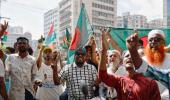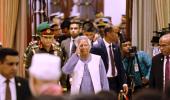Former Bangladesh Prime Minister Sheikh Hasina's son Sajeeb Wazed Joy said that while he has no evidence of direct US involvement in the student protests in the country, the support for Muhammad Yunus--whom he describes as a "darling of the west"--indicates possible foreign influence.

Wazed added that the West has long championed Yunus, who was appointed as the head of Bangladesh's interim government on August 8, and was quick to support his government, leading him to believe that foreign involvement in the unrest is evident.
In an exclusive interview with ANI, Wazed said, "Was the US directly involved? I don't know. I have no evidence. But if you look at the situation and the protests, you see the protests were incited and inflamed every step of the way."
He pointed out that the protests were initially peaceful and not directed against the government but rather against a court ruling, which the government also opposed.
"When the protests first started, they were peaceful. Our police were guarding them. The protest wasn't against the government's action. Our government had reduced quotas years ago after the first round of protests against quotas. The quotas were reinstated by the courts, and our government had filed an appeal against that. We were waiting for the Supreme Court to hear it," he explained.
Wazed said that he believed a foreign supplier provided firearms to the protesters.
"The protesters started attacking the police while bearing firearms. Where did these protesters get firearms? Only a foreign intelligence service can supply firearms in a country. Foreign has instigated and supported this. I don't know if it's from the western side, but if you look at who these protesters have selected--Yunus. He's a darling of the west. They've been championing him, trying to get him into politics for decades. The west was the first to congratulate his government and support it. So I think they're making it quite obvious that they probably had some involvement in this whole matter," Wazed claimed.
Wazed alleged that protesters distorted Sheikh Hasina's statement on Razakars, which led to the escalation of the protests.
"Someone took a statement from my mother, twisted it, and spread it tremendously online. She said we don't want families of Razakar getting government jobs, but they twisted that into my mother calling the protesters Razakars, which she never did. Clearly, some agencies were very active online to inflame the situation. On the night of July 15, when our government appealed to the Supreme Court that we wanted quotas to be rescinded, someone started marching at Dhaka University in the middle of the night, chanting, 'We are Razakars.' This inflamed our student activists and they attacked the protesters," he said.
Wazed added that the police attempted to stop the violence and used excessive force, prompting the government to suspend those officers.
"The police stepped in to try to stop the violence. Some police members used excessive force. Our government immediately told our student activists, our Bangladesh Chhatra League, to back down, and the violence stopped. We formed a three-member judicial commission to investigate the deaths, and suspended all the police officers who used excessive force. So our government did everything to quell the violence. The violence was never ordered by our government; the violence was instigated by some unknown party deliberately," Wazed added.
Bangladesh is facing a fluid political situation with Sheikh Hasina, tendering her resignation from her post on August 5 in the wake of mounting protests.
The protests erupted in early July due to demands for reforming the quota system that reserves civil service jobs for specific groups, including descendants of 1971 war veterans.
Nobel laureate and economist Muhammad Yunus, 84, was sworn in as the head of Bangladesh's interim government on Thursday, August 8, just three days after Sheikh Hasina's resignation from her post.










